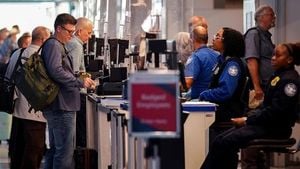Former Vice President Kamala Harris found herself at the center of political turbulence this weekend, as her national book tour stop in Chicago was repeatedly disrupted by protesters and, just a day later, she leveled sharp criticisms against President Donald Trump’s administration in a televised interview. The back-to-back events underscored the heightened tensions and deep divisions currently gripping American politics, especially as the country grapples with questions about the rule of law, presidential power, and the future of democracy.
On Saturday, October 11, 2025, Harris was in Chicago promoting her new memoir, 107 Days, which details her whirlwind 107-day campaign for the presidency after President Joe Biden withdrew from the 2024 race. The event, intended as a celebration of her political journey and a candid look behind the scenes of a tumultuous campaign, quickly turned contentious. According to Fox News, several protesters interrupted Harris as she spoke, forcing security to intervene multiple times. One woman shouted from the audience, prompting others to demand her removal. Not long after, a man was escorted out after shouting about genocide, while pro-Palestinian demonstrators labeled Harris a “war criminal.”
Harris, maintaining her composure, responded to the accusations directly. “I’m not the president. If you want to go to the White House and talk to him, then go do that,” she retorted, drawing applause from the audience. She also referenced mass deportations that had occurred under Donald Trump’s “MAGA rule,” shifting the focus to her Republican rival. The host of the event urged the crowd to show respect, stating, “We encourage people to use their voices, but we want them to show respect for this woman.” Harris, adding a touch of humor, quipped, “And please pronounce my name correctly.”
This was hardly the first time Harris’s book tour had faced public unrest. Since the launch of her national tour in September, similar protests have erupted at multiple stops, reflecting broader dissatisfaction among some groups with both her policies and the Democratic leadership’s handling of international crises. Social media buzzed with commentary, with many netizens pointing out that the Israel-Hamas war, which escalated in October 2023, unfolded under Biden’s presidency. They noted that MAGA supporters credit Trump with ending the conflict swiftly after taking office—a claim that continues to fuel partisan debate online.
The following day, Harris appeared on MSNBC’s The Weekend, where she didn’t hold back in her criticism of President Trump. In a conversation with host Eugene Daniels, Harris accused Trump of waging a “full-on frontal attack on the rule of law in our country.” Asked about Trump’s alleged pressure campaign on the Department of Justice—specifically, the recent indictments of New York Attorney General Letitia James and former FBI Director James Comey—Harris was unequivocal. “This is a full on frontal attack on the rule of law in our country,” she said, as reported by MSNBC. She went on: “I think he has a vengeance campaign, which is, I think, really exposing the petty nature of who he is and his deep level of insecurity that he feels that he has to use the power of the federal government and the United States Department of Justice to go after people who have disagreed with him, or as prosecutors who have used a combination of the fact and law to prosecute him.”
Harris’s remarks echoed a growing chorus of concern about the politicization of the Justice Department. “I don’t know if we can trust what’s coming out of the Department of Justice right now. And that pains me to say that, as someone who spent the majority of my career as a prosecutor, where the work of a prosecutor should be to do justice,” she lamented. Harris stressed that prosecutors, especially those at the federal level, should conduct their work “without any fear and not in the interest of favor, and that so clearly is not what is ruling the day there.”
The MSNBC segment also featured expert commentary on the broader implications of Trump’s actions. According to the network, legal experts described the ongoing campaign at the Department of Justice as “transparently corrupt,” while politicians and former officials voiced alarm about the use of federal power for personal vendettas. The show highlighted the impact of the government shutdown, which has led to thousands of federal workers being laid off and morale plummeting across agencies. Federal employees interviewed by MSNBC described the current climate as “a lawless land,” reflecting a sense of instability and frustration within the ranks of government service.
Illinois Attorney General Kwame Raoul, also appearing on The Weekend, characterized the president as someone who “does not have a good relationship or familiarity with the truth,” underscoring the deep mistrust between state and federal officials. Meanwhile, Minnesota Attorney General Keith Ellison called Trump’s targeting of Letitia James “the trashing of the American justice system,” further highlighting the unprecedented nature of the current political strife.
The debate over the rule of law has become a flashpoint in American discourse, with both sides accusing the other of undermining democratic institutions. Harris’s warnings about the Department of Justice reflect a broader anxiety among Democrats and legal scholars that the traditional independence of prosecutors is being eroded by political interference. On the other hand, Trump’s supporters argue that his actions are necessary to root out what they perceive as corruption and bias within the federal bureaucracy. This clash of perspectives is playing out not just in Washington, but in city halls, state legislatures, and, as Harris’s book tour demonstrates, in public forums across the country.
For Harris, the personal stakes are high. Her memoir, 107 Days, offers a rare glimpse into the internal dynamics of her campaign and the political headwinds she faced after Biden’s departure from the race. The book details staff tensions, tough decisions, and the relentless scrutiny that comes with seeking the nation’s highest office. The protests she now faces on her tour are, in some ways, a continuation of those challenges—evidence that the divisions she describes in her memoir remain very much alive in the present moment.
As the former vice president continues to defend her record and speak out against what she sees as threats to democratic norms, the country watches closely. The weekend’s events—disruptions at her book tour and her pointed remarks on national television—are a vivid reminder of just how fraught and polarized the American political landscape has become. With the 2024 election cycle still fresh in the nation’s memory, and a new administration already stirring controversy, the struggle over the rule of law and the direction of the country shows no signs of abating.
For now, Harris stands at the intersection of protest and power, her voice a lightning rod for both criticism and support as the United States navigates one of the most contentious chapters in its modern history.





